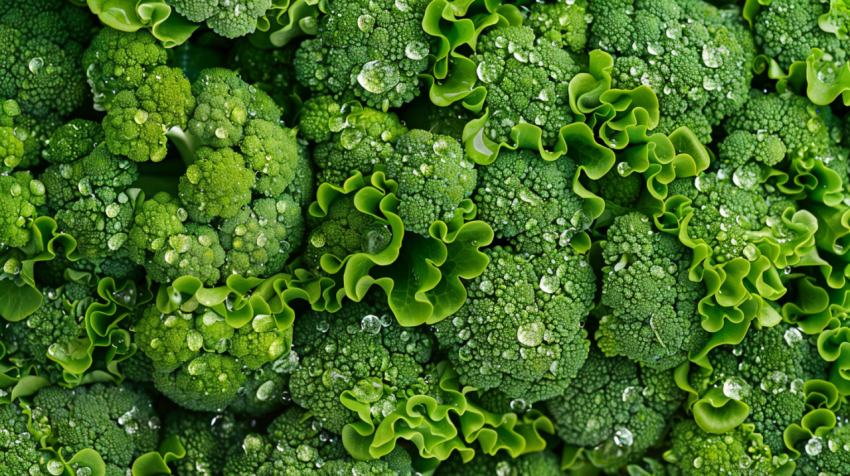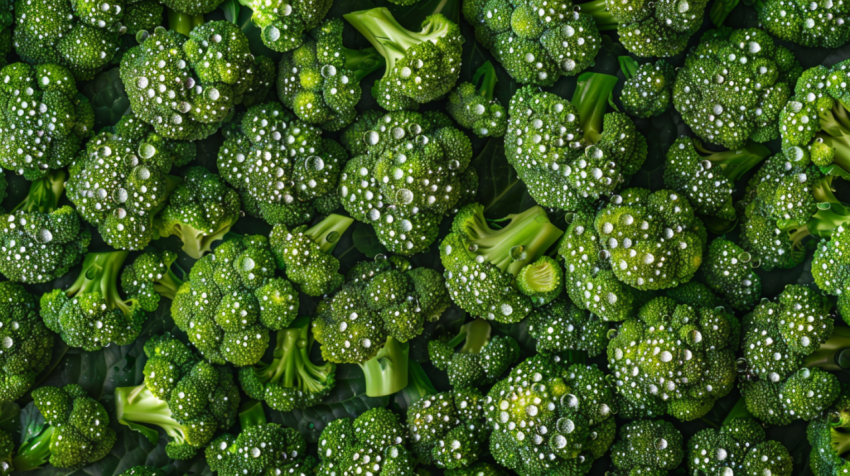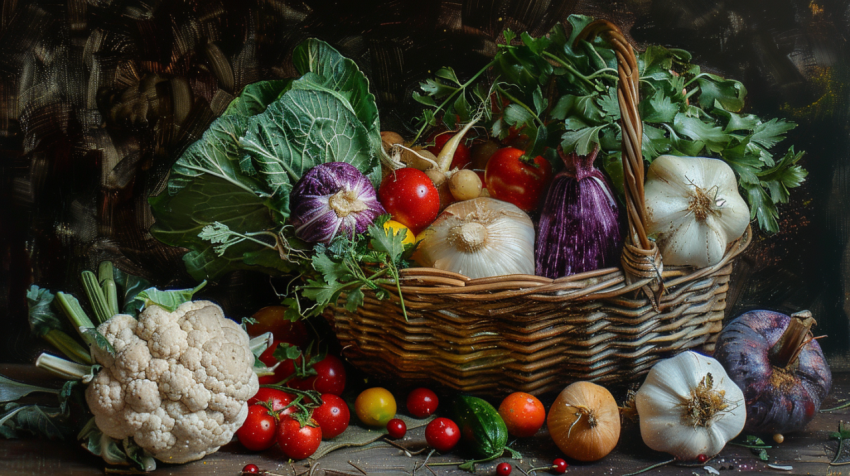











Vegetables: The Foundation of a Healthy and Vibrant Diet
Vegetables, the edible parts of plants, are essential components of a healthy diet, providing a wealth of vitamins, minerals, fiber, and antioxidants. They come in a dazzling array of colors, shapes, textures, and flavors, offering endless culinary possibilities. From leafy greens to vibrant root vegetables, the world of vegetables is a treasure trove of nutrition and taste, contributing to overall well-being and helping to prevent chronic diseases.
1. Classifying Vegetables: A Diverse and Colorful Group
Vegetables can be classified in various ways, including by the part of the plant that is eaten:
- Leafy Greens: Spinach, kale, lettuce, collard greens, Swiss chard - rich in vitamins A, C, and K, as well as folate and iron.
- Cruciferous Vegetables: Broccoli, cauliflower, cabbage, Brussels sprouts, kale - known for their cancer-fighting compounds.
- Root Vegetables: Carrots, potatoes, beets, sweet potatoes, radishes, turnips - good sources of carbohydrates, fiber, and various vitamins and minerals.
- Allium Vegetables: Onions, garlic, leeks, shallots, chives - known for their pungent flavors and potential health benefits.
- Fruiting Vegetables (Botanically Fruits): Tomatoes, peppers, cucumbers, eggplants, zucchini, squash - often used in savory dishes and provide various vitamins and antioxidants.
- Legumes (Mature): While often grouped with vegetables, legumes such as dried beans, lentils, and peas are technically the seeds of pod-bearing plants. They are a great source of protein and fiber.
- Stems and Shoots: Asparagus, celery, rhubarb.
2. Nutritional Powerhouses: The Health Benefits of Vegetables
Vegetables are packed with essential nutrients that contribute to overall health and well-being:
- Vitamins: Vegetables are rich sources of various vitamins, including vitamin A (beta-carotene), vitamin C, vitamin K, folate, and B vitamins.
- Minerals: They provide essential minerals like potassium, magnesium, iron, calcium, and zinc.
- Fiber: Vegetables are an excellent source of dietary fiber, which aids digestion, promotes satiety, and helps regulate blood sugar levels.
- Antioxidants: Many vegetables contain antioxidants, compounds that protect cells from damage caused by free radicals.
- Phytonutrients: These are naturally occurring plant compounds that may have various health benefits.
3. Vegetables and Disease Prevention: A Foundation for Well-being
Consuming a diet rich in vegetables has been linked to a reduced risk of chronic diseases:
- Heart Disease: Vegetables can help lower blood pressure, improve cholesterol levels, and reduce inflammation, all of which contribute to heart health.
- Type 2 Diabetes: The fiber in vegetables helps regulate blood sugar levels, and their low glycemic index makes them a good choice for people with diabetes.
- Cancer: Some vegetables, particularly cruciferous vegetables, contain compounds that may help protect against certain types of cancer.
- Obesity: Vegetables are low in calories and high in fiber, which can help with weight management.
- Other Conditions: May improve bone health, eye health, and cognitive function.
4. Cooking with Vegetables: A World of Culinary Possibilities
Vegetables are incredibly versatile in the kitchen and can be prepared in countless ways:
- Raw: Many vegetables, such as lettuce, tomatoes, cucumbers, and carrots, can be enjoyed raw in salads or as snacks.
- Steaming: A healthy cooking method that preserves nutrients.
- Boiling: A simple cooking method, but some nutrients can be lost in the water.
- Roasting: Brings out the natural sweetness of vegetables and creates a caramelized exterior.
- Grilling: Adds a smoky flavor and attractive grill marks.
- Stir-frying: A quick cooking method that is popular in Asian cuisine.
- Braising: Slow cooking in liquid, resulting in tender and flavorful vegetables.
- Pureeing: Vegetables can be pureed to make soups, sauces, and dips.
5. Vegetables Around the World: Global Culinary Traditions
Vegetables play a central role in cuisines around the world:
- Mediterranean Cuisine: Emphasizes fresh vegetables like tomatoes, cucumbers, onions, peppers, and leafy greens.
- Indian Cuisine: Features a wide variety of vegetables in curries, stews, and lentil dishes.
- Asian Cuisine: Utilizes a vast array of vegetables in stir-fries, soups, and noodle dishes.
- Mexican Cuisine: Incorporates vegetables like tomatoes, onions, peppers, and corn in many traditional dishes.
6. Organic vs. Conventional Vegetables: Understanding the Difference
- Organic vegetables are grown without the use of synthetic pesticides, herbicides, or fertilizers.
- Conventional vegetables may be grown with the use of these synthetic chemicals.
- There is ongoing debate about the nutritional differences between organic and conventional vegetables, but some studies suggest that organic produce may have higher levels of certain nutrients and antioxidants.
- Organic farming practices are generally considered to be more environmentally sustainable.
7. Growing Your Own Vegetables: From Seed to Table
Growing your own vegetables can be a rewarding experience:
- It allows you to have access to fresh, homegrown produce.
- It can be a fun and educational activity for the whole family.
- Home gardening can also be a way to save money on groceries.
- Even a small container garden can yield a surprising amount of vegetables.
8. The Future of Vegetables
- With a growing global population, there is an increasing need to produce vegetables more efficiently and sustainably.
- Vertical farming, hydroponics, and other innovative agricultural techniques are being developed to address this challenge.
- Plant-based diets are becoming increasingly popular, further highlighting the importance of vegetables in a healthy and sustainable food system.
Conclusion:
Vegetables are essential for a healthy and vibrant life, providing a wealth of nutrients, contributing to disease prevention, and offering endless culinary possibilities. From the familiar favorites to the exotic and unusual, the world of vegetables is a colorful and flavorful landscape waiting to be explored. By embracing a diet rich in vegetables, we can nourish our bodies, support our well-being, and contribute to a more sustainable food system. Their versatility, nutritional value, and delicious flavors make them a cornerstone of healthy eating and a key ingredient in cuisines around the globe.
Vegetables, types of vegetables, list of vegetables, leafy greens, cruciferous vegetables, root vegetables, vegetable nutrition, health benefits of vegetables, vegetable recipes, how to cook vegetables, cooking vegetables, organic vegetables, growing vegetables, vegetable garden, vegetarian, vegan, vitamins, minerals, fiber, antioxidants, vegetables and fruits, healthy eating, nutrition, diet, weight loss, heart health, cancer prevention, diabetes, farmers market, produce.

